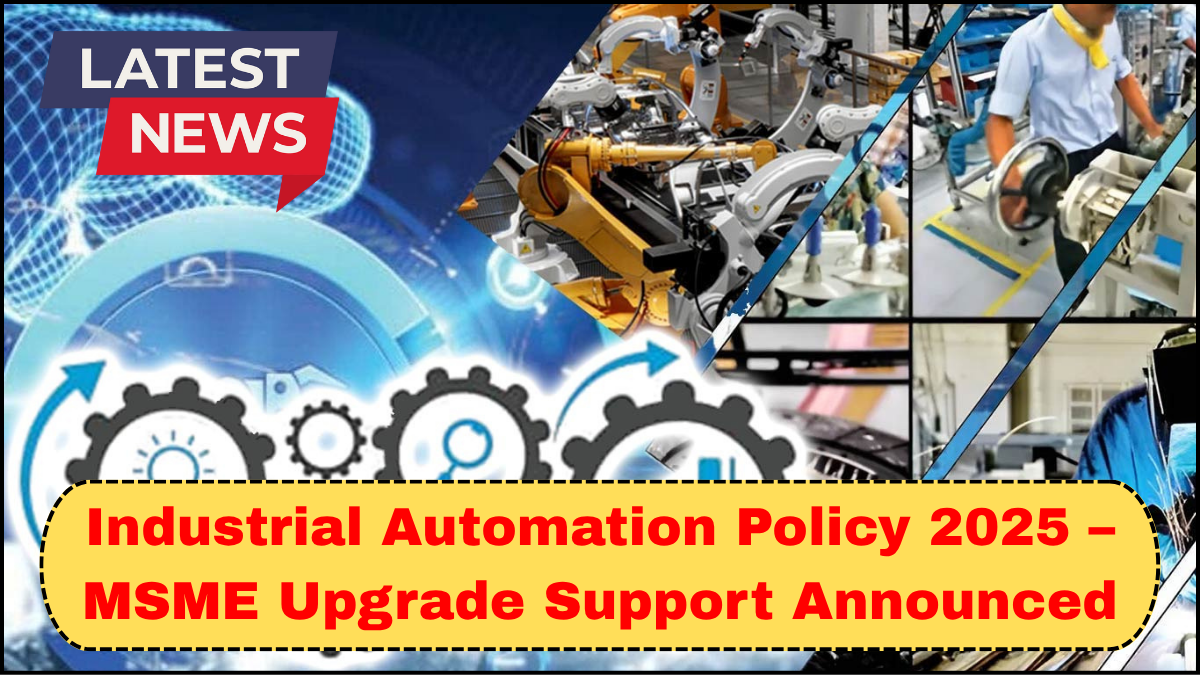India has taken a major step forward in its manufacturing transformation with the Industrial Automation Policy India 2025, a strategic framework designed to modernize the industrial sector, enhance competitiveness, and integrate cutting-edge automation technologies. A key highlight of the policy is the targeted MSME upgrade initiative, aimed at accelerating digital adoption and automation among micro, small, and medium enterprises (MSMEs).

A New Era of Smart Manufacturing
The Industrial Automation Policy India 2025 is more than a policy—it’s a nationwide call to prepare industries for the next wave of industrial innovation. Centered around the principles of Industry 4.0, the policy envisions the integration of technologies like AI, IoT, robotics, and data analytics into manufacturing workflows across India.
While large-scale enterprises have gradually adopted automation, MSMEs—which make up over 90% of India’s manufacturing ecosystem—have lagged behind due to cost constraints, lack of awareness, and skill gaps. Recognizing this challenge, the policy introduces strong support mechanisms to enable MSMEs to adopt automation without being left behind.
Key Features of the MSME Upgrade Initiative
The MSME upgrade initiative under the policy focuses on practical, scalable, and financially feasible solutions to help smaller enterprises transition into automated, tech-driven units. Here’s how:
1. Subsidized Technology Adoption
Government-backed financial incentives will cover a significant portion of costs related to adopting automation tools and upgrading production equipment. MSMEs investing in smart manufacturing technologies will receive grants or low-interest loans through special funding programs.
2. Skill Development and Training
To make automation viable, the workforce needs to be ready. The initiative includes partnerships with technical institutes and automation companies to deliver hands-on training for MSME employees. These programs will focus on machine operation, predictive maintenance, and software integration.
3. Cluster-Based Support Models
Automation support will be rolled out using cluster-based approaches. This means MSMEs operating in industrial hubs will share access to common testing labs, digital infrastructure, and expert consultants—reducing individual investment burdens.
4. Digital Readiness Audits
To ensure investments are strategic and effective, MSMEs can avail government-sponsored digital audits. These assessments evaluate a unit’s readiness for automation and suggest customized roadmaps based on sector-specific needs.
5. Vendor-Industry Matchmaking
The policy also facilitates direct linkages between MSMEs and certified automation solution providers. Through online platforms and national expos, enterprises will get access to vetted technology vendors offering scalable automation products.
Why Industrial Automation Matters for MSMEs
In today’s competitive landscape, automation is not a luxury—it’s essential. MSMEs that adopt automation gain several advantages:
-
Enhanced Productivity: Automated processes reduce manual errors and improve output consistency.
-
Operational Efficiency: With intelligent systems in place, resource consumption is optimized, leading to cost savings.
-
Market Competitiveness: Automated units can meet global quality standards, opening doors to export markets.
-
Scalability: Automation allows smaller units to scale operations without proportional increases in labor costs.
By embracing the vision of the Industrial Automation Policy India 2025, MSMEs can unlock their full potential and actively contribute to India’s ambition of becoming a global manufacturing powerhouse.
Implementation Timeline and Monitoring
The policy outlines a three-phase rollout:
-
Phase 1 (2025-2026): Awareness, digital audits, and pilot projects in select MSME clusters.
-
Phase 2 (2026-2028): Widespread rollout of automation tools and training across high-potential sectors like automotive, electronics, textiles, and food processing.
-
Phase 3 (2028-2030): Integration with global supply chains, AI-based manufacturing systems, and export-driven scaling.
Progress will be tracked using a centralized monitoring dashboard, allowing for real-time feedback, impact assessment, and course correction.
Frequently Asked Questions (FAQ)
What is the Industrial Automation Policy India 2025?
It is a strategic government initiative aimed at transforming India’s industrial landscape through automation technologies. It focuses on Industry 4.0, digital transformation, and capacity-building—especially for MSMEs.
How does the MSME upgrade initiative benefit small manufacturers?
It offers financial support, training, and access to digital tools that help MSMEs modernize operations, increase productivity, and compete globally.
Is this policy applicable across all sectors?
Yes, but it prioritizes sectors with high potential for automation like automotive, electronics, garments, chemicals, and food processing.
What types of automation technologies are included under the policy?
Robotics, AI, IoT, machine vision, CNC systems, cloud manufacturing platforms, and process automation tools are all part of the eligible technologies.
How can MSMEs apply for support under this initiative?
MSMEs can register through dedicated government portals (to be launched under the policy), undergo digital audits, and apply for funding or training based on their readiness and sector.
click here to learn more